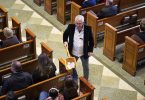by Carol Zimmermann
WASHINGTON (CNS) — Prayers for peace at Catholic schools and parishes around the country Sept. 9 are meant to “build relationships and plant seeds in people’s minds and hearts” said Bishop Shelton J. Fabre of Houma-Thibodaux, Louisiana.
He said the nationwide celebration of a Day of Prayer for Peace in Our Communities should “raise awareness” of violence and racism within communities and empower people to do the work needed to restore racial harmony. “We always begin with prayer, which prompts us to action,” said the bishop in a Sept. 8 telephone news conference. Bishop Fabre is a member of the new task force, chaired by Atlanta Archbishop Wilton D. Gregory that supports the bishops in marking the day of prayer and in other efforts to promote peace and healing.
Named the USCCB Task Force to Promote Peace in Our Communities, the group will finish its work with a report on its activities and recommendations for future efforts at the November General Assembly of U.S. bishops.
At Catholic churches and schools in Louisville, Kentucky; Cincinnati; Chicago; Salt Lake City; Philadelphia; Baltimore; Wilmington, Delaware; and elsewhere, Catholics will gather for prayers or Mass, and bells will ring at selected times Sept. 9. Some bishops have urged Catholics in their diocese to fast that day.
Baltimore Archbishop William E. Lori planned to lead a prayer walk in Baltimore the evening of Sept. 9 with priests, ministry leaders and local Catholics that would stop where recent acts of violence have occurred.
After the walk, the archbishop was scheduled to hear from representatives of six city parishes describing conditions they face which the church could address.
The day for prayer was announced in July by Archbishop Joseph E. Kurtz, of Louisville, Kentucky, and president of the U.S. Conference of Catholic Bishops in response to shootings that took place in Baton Rouge, Louisiana; Minneapolis; and Dallas.
In announcing the event and the new task force, the archbishop said there needs to be “ways of nurturing an open, honest and civil dialogue on issues of race relations, restorative justice, mental health, economic opportunity and addressing the question of pervasive gun violence.”
“By stepping forward to embrace the suffering, through unified, concrete action animated by the love of Christ, we hope to nurture peace and build bridges of communication and mutual aid in our own communities,” he said in the July 8 announcement.
The day chosen for nationwide prayer is the feast of St. Peter Claver, the Spanish Jesuit priest and missionary who ministered to slaves for 40 years in Colombia and became the patron saint of slaves and ministry to African-Americans. He is said to have personally baptized about 300,000 slaves.
Archbishop Gregory and Bishop Fabre told reporters that the U.S. bishops are in beginning stages of developing a pastoral letter on racism.
Bishop Fabre said the letter will examine how racism manifests itself in society and the church today and will encourage people to dialogue and raise awareness about the issue. While progress has been made, he said, more work needs to be done.
He also said the pastoral letter will include action steps that Catholics can follow to bring about healing and reconciliation.
The bishops stressed that even though the parish and school-wide activities planned for the day of prayer were not large scale, they hoped the events would spark conversation and further dialogue.
When asked in particular how bridges might be built between police officers and local communities, Bishop Fabre, chairman of the USCCB’s Subcommittee for African American Affairs, said bridges should be built long before something happens — “in times when there are no incidents and there is peace.”
He urged communities to work on building trust “before tensions run high” and always be in dialogue with each other. “Build bridges now before they are needed,” he said, “so when they are needed, they are in place.”






